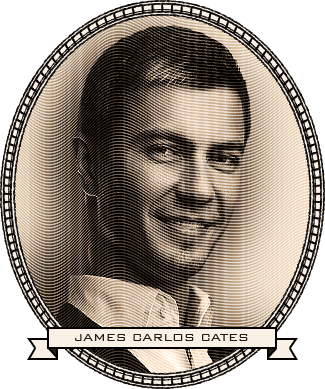June 13th, 2014
Episode 11: Consenting Republican Adults
The old ranch truck slides to a stop at the crossing of FM 669, and a cloud of dust washes over the truck. The passenger door creaks loudly as James Carlos Cates steps out to unchain the gate.
Britt Huff drives the truck across 669 while Cates closes and rechains the gate. Then Cates crosses the road and opens the gate on the other side.
Cates notices that there is no cattle guard on this side of Huff’s 6,500 acre working ranch, Tomorrow. He asks Huff about it when he climbs in.
“Cattle, oil, and gas back there,” Huff responds. “Wind and cotton up ahead. Well, there used to be cotton, anyway.”
Cates watches as Huff puts the truck in gear and starts forward again. Huff is wearing a pistol on his hip, and Cates can see the bulge of another gun strapped to Huff’s ankle.
Huff is a veteran. Cates’ research turned up reams of records from Huff’s time as a combatant in the Middle East. He started out as an infantryman, guarding the gate to a FOB in Afghanistan. Late in his second tour, he was suddenly promoted and transferred to a post at an undisclosed, overseas office of the Defense Clandestine Service. During his final tour of duty, he was stationed at the Pentagon, where he served as a Special Liaison for Counterinsurgency Operations.
Huff was treated for PTSD-like symptoms a half-dozen times during his military service, but he was never officially diagnosed as having the illness. The lack of diagnoses might have been a military SNAFU, or it might have been some higher-ups’ decision to keep it quiet – to protect what once appeared to be a promising military career for Huff.
Either way, when Huff returned to civilian life in Texas and was later tried for killing an intruder in his home, the lack of a diagnoses and Huff’s failure to pursue additional treatment back home were topics greatly debated by people who followed his trial closely.
Cates looks again at the gun on Huff’s hip. “Why is he carrying two guns, while driving on his own property, in the middle of nowhere?” Cates wonders.
Cates waits for Huff to say something, but he is driving fast, and he seems focused on scanning the road ahead. Cates notes that there are no communication devices in the truck, except for an aging, handheld CB transceiver clipped to the visor above Huff’s head. The CB does not appear to be on.
“Mind if I smoke,” Huff asks after several minutes of silence. Cates nods his assent.
Huff returned from the war with a new, self-imposed mission. Leveraging his family’s modest mineral and real estate holdings in West Texas and the Panhandle, he slowly pieced together Tomorrow – a cooperative-style network of oil and gas, cattle, and cotton production.
As the ranch’s community of engineers, laborers, cowboys, farmers, e-commuters and artists continued to grow, the cooperative invested in never-before-tried water reuse technologies – a big gamble that succeeded. Later, when subsidies fell through for the wind harvesting turbines in which the group was already invested, Huff supplied from his personal holdings the capital needed to move the project forward.
It didn’t take long for Huff and Tomorrow toattract media attention. But Huff didn’t want it. If he had simply said nothing when questioned, the media would have lost interest in him.
Instead, whenever he was invited to speak or comment, he would ignore the questions asked and stubbornly limit his comments to broad, declarative expressions of support for the continued expansion of the Constitutionally-guaranteed civil rights for which so many of his comrades-in-arms had died.
During one impromptu exchange in an online, Republican social forum, Huff offhandedly threatened to start an organization called Consenting Republican Adults. CRA, Huff suggested, would do what needed to be done to protect homosexuals’ right to live and do business in peace.
“If you pay your bills, pay your taxes and work to make this community a better place, I don’t give a damn what you do with other consenting adults behind closed doors.”
As he had done many times before, Cates wonders what Huff meant when he said that he would do what needed to be done to protect homosexuals’ civil rights. From a schoolteacher or a politician, those words sound like rhetoric. From a soldier, they sound like something more.
Huff did not disclose his sexuality during that brief discussion about Consenting Republican Adults, but most of the comments in response to Huff’s “plan” to establish such an organization had clearly led many readers to assume that Huff was gay. One commenter directly asked Huff about his sexuality. Huff responded, “I’ve never been a man who needed sex, and I’m married to my work.”
A registered user of the forum on which Huff’s comments were made – a young, unemployed veteran – participated in the conversation by commenting, “I was taught that homosexuality is an abomination, and it doesn’t matter if you consent to a sin against God. Its still a sin, and we are bound by the miracle of baptism to reject all ungodly acts”
For reasons that may never be fully explained, the man who made the miracle-of-baptism comment tracked down Huff online, and several week later he snuck into Huff’s house late at night. Based on the communications uncovered by police investigating the killing that followed, it was clear that the young veteran was angry that Huff was a soldier, like him. He wrote that he didn’t want his service to be “dirtied by Huff’s pedafilia (sic).”
While the details regarding what the man planned to do in Huff’s house were never fully uncovered, the following is known for certain: a photograph of the young veteran – who had been shot in the stomach, the genitals and the face – was posted online around the time that the coroners said the man was killed.
After two days of further investigation, the picture helped lead police to Huff’s house, where they found the young man’s decaying body. A loaded but unfired handgun (the owner of which was never identified) sat on the floor, several feet from the corpse.
Huff was nowhere to be found, and a search began. Local law enforcement from Big Spring, Snyder, Post, Lamesa, and Midland all worked together to find Huff, who was a respected community leader feared dead.
He was located two days later, when a private psychiatric hospital in Lubbock responded to an inquiry from the Lubbock County Sherriff’s Office.
Facility staff said that Huff arrived naked and in a panicked, manic state. He was with a female companion, but the woman promptly disappeared as soon as Huff was admitted. She was never seen again, nor could investigators identify her from the facility’s security cameras.
Staff at the private hospital said that they had no idea that Huff had been involved in a shooting when they took him him. When he arrived, he was naked and as helpless as a baby, they explained. They used his thumbprint to identify him, and he was well insured. They tried to contact his primary care physician and his lawyer – the only emergency contacts listed in Huff’s medical records. But neither of the men could be reached. At that point, early in his treatment, helping calm his crisis state was more important, doctors explained, than finding the people to whom he belonged.
When he gave a statement to police in front of his doctors and his lawyers, Huff said he had no recollection of the events that led to his arrival at the hospital.
During the trial that followed, prosecutors laid out their theory that Huff shot the intruder in the stomach first, blew off his genitals some time later, and finally executed him – by shooting him in the face – up to an hour after that first shot to the gut. To support their claim that the young veteran was tortured and murdered, they speculated that the misguided and undereducated veteran was simply trying to rehabilitate Huff. Prosecutors argued that the young man’s appearance in Huff’s home was an unforgivable crime, certainly, but not a crime worthy of torture, pain and death.
In the end, it didn’t matter what the prosecutors thought. No Texas jury was going to convict a veteran who defended himself inside his own home. Whenever difficult questions were raised regarding Huff’s odd behavior, his defense team always responded in the same way: here’s something else about PTSD that most people don’t know.
Cates shifts uncomfortably in his seat. He is reflecting on the fact that he has never come close to killing anyone when Huff stops the truck suddenly.
“Let’s get out here.”
The stark, dusty grassland stretches in every direction as far as Cates can see. Other than the cluster of wind turbines in the distance, nothing stands taller than two or three feet high off the ground. Cates kicks at a rock with his boot.
“This is where our cotton used to be,” Huff says.
Although Cates knew before his arrival that he was going to see land that was part of the Speaker’s drought and native species restoration project, it is hard for Cates to wrap his head around the scope of the project, which turned a cotton farm into what he sees before him.
“And its not just here,” Huff reminds Cates. “There are pilot projects like this all over the state. Rural restoration projects, suburban conservation initiatives, urban sustainability models – the money is being spent as fast as they can collect it.”
“Is this going to solve our water challenges?” Cates asks over his shoulder. He reminds himself that he is a candidate now, not an incumbent. He should say water “problems” instead of “challenges”.
Huff frowns thoughfully. “Yes, its gonna solve some limited, water-related problems, but its gonna create problems, too. It might create more problems that it will ever fix, but who can measure that. Hell, half the people who live around here think this is a brilliant plan.”
Cates has been waiting to ask Huff a question ever since Endsley first told Cates that Huff would make a good ally. “Why did you take the money? Why didn’t you just keep growing cotton, like so many farmers in the area?”
Huff climbs up into the bed of the pick-up truck and stands on the toolbox, looking back in the direction from which they had just driven.
“Because I’m just a business man,” he says after several minutes of silence. His eyes look pained. “And this pilot project pays more than cotton. If the money dries up or its gets spread too thin, I’ll argue that we should go back to cotton. But that won’t be an easy sell for a lot of people involved in the cooperative.”
From what Cates knows about Huff’s work, Huff is more than “just a businessman.” But that doesn’t matter now; Cates is here to do business.
Huff seems to know what Cates is thinking.
“What you have to understand, James, is that you’re standing smack dab in the middle of a huge, convoluted war, inside of which there are unique battles taking place between diverse communities of interest. You got your cities afraid of agriculture, suburban customers versus their utilities, environmentalists fightin’ industry, and energy producers tryin’ to knock down other, competing energy producers. Etcetera, etcetera, etcetera. There is no clear map of the landscape, and there is certainly no clear solution.
“But don’t get me wrong. This battle has been going on in one form or another since man’s beginning. Everyone wants to feed their families, pay their mortgages, and be above ground for as long as possible. The battle is just a cost of doing business.”
Cates smiles. “I’m not looking to get into a huge fight; I just want to prove that this water project is a failure.”
“Can’t be done, “ Huff replies matter-of-factly. “But you can find what you’re looking for right here, where your feet are currently planted. This is the brackish economic pool in which our state – one of the strongest in the union, by God – and its major economic drivers come together right here to build and maintain civilization.”
Huff laughs to himself. “I probably sounds like every old businessman who ever lived. You didn’t come here for that.”
“This is the best investment of time I’ve made in months,” Cates replies politely.
Huff nods. He knows Cates is not hearing everything that Huff wants him to hear. He gathers his thoughts and focuses on the goal at hand:
“The first question you have to ask yourself is this: who is the only group at the table who is motivated by something other than money.”
Cates thinks for a minute, but he doesn’t answer. “And when I find the answer to that question?” Cates asks.
“Then you better invest the rest of your brain power in figuring out how to catch up, because the Speaker already knows the answer to that question.”
“I’m not here to fight the Speaker,” Cates explains.
“Well, then, you sure made a foolish decision when you challenged his policies directly,” Huff shakes his head with genuine disappointment that borders on disgust. He climbs down from the bed of his truck.
“Come on,” Huff says, “I got a couple of engineers waiting up here to show you the turbines. Best to stick to the schedule. When we spend time on activities unrelated to your goal – like lookin’ at the mechanics of those wind turbines – it will be more difficult for your opponents to surmise the reason for your visit here today.”
“Does it matter what my opponents think?” Cates asks while Huff circles the truck, checking its tires. “Does that change what a public servant must do?”
“It should. Or, it should be factored into the equation, at least. Either way, because you publically announced to everyone on the playing field that you’re going after water, your moves are being watched very closely. I’m not talking about a conspiracy. There’s just a lot of folks around here who’s money and families are deeply tied to what you’re talking about.”
Cates climbs into the passenger seat.
“What do you do with a man who doesn’t want money?” Cates asks.
“Keep him close,” Huff responds. “He’ll make a committed fightin’ ally. But if he gets out of line, you’ll have to help him fall on his sword.”













Comments
COMMENT POLICY
The Independent Candidate is pleased to include your comments and observations about this story. We encourage lively debate on the issues of the day, but we ask that you refrain from using profanity or other offensive speech, engaging in personal attacks or name-calling, or posting advertising. To comment, you must be a registered user of The Independent Candidate, and your user name will be displayed. Thank you for sharing your thoughts. We're here to serve.
You must be logged in to leave a comment.
Login | Register
June 17, 2014
Barbara
I tried to open this on FB by searching for The Independent Candidate. It has always come up in the past but did not today. Just fyi. Also, I found this episode very intriguing.